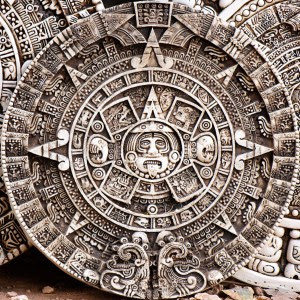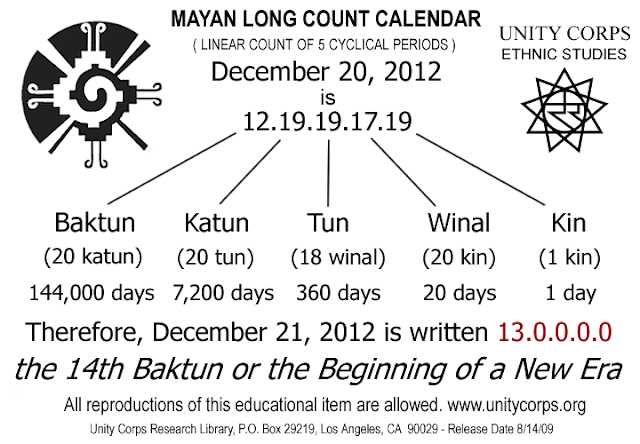New from NPR! 末日預言原來是誤會一場
上圖這張相片是馬雅人的計時工具石刻。可能我真是太膚淺且電玩魂上身,這圓呼呼的輪子中間吐舌頭的圖像,一直讓我想起之前瘋狂愛玩的電玩遊戲Inca Zuma...呃...
沒空上的NPR,大家請下載收聽。至於電玩,呃...現在app store也有Inca Zuma了,我已經買了,不用滑鼠點,用手指更靈巧,大家可以試試看。啊哇哈哈哈哈....
下載聲音檔請點我
下載填空版本請點我
Maya
Expert: The 'End Of Times' Is Our Idea, Not The Ancients'
上圖為馬雅人計算時間的方式與計算單位
Copyright ©2012 National Public Radio. For personal, noncommercial use only. See Terms of Use. For other uses, prior permission required.
STEVE INSKEEP,
HOST:
It's MORNING
EDITION, from NPR News. I'm Steve Inskeep.
DAVID GREENE,
HOST:
And I'm David
Greene.
Well, it is
here. Tomorrow will be December 21st, 2012. Some believe it's the day the
ancient Mayan civilization馬雅文明 predicted
the world would end. Most people do not believe this. And yet, this idea of the apocalypse天啟(末日) has stuck, helped in part by popular mass media大眾傳媒, including
this blockbuster Hollywood film賣座好萊塢影片 from three
years ago. It was called "2012."
UNIDENTIFIED
MAN #1: This mass suicide (unintelligible) to the Mayan calendar, which
predicts the end of time to occur on the 21st of December of this year.
UNIDENTIFIED
MAN #2: What are the odds?
GREENE:
Strange to hear about a date that is finally here. Well, to learn exactly what
the Mayans said and to try and hopefully put your mind at ease舒緩/平靜, we turned to David Stuart. He's the man
who cracked the code解碼 that was
needed to read Mayan hieroglyphics象形符號/文字, and he joined us from Austin, where he's
director of the Mesoamerica中美洲 Center at the University of Texas.
Professor,
thanks for coming on.
DAVID
STUART: Hey, thanks for having me.
GREENE:
Well, I guess, let me turn to a question that, in thinking about it, seems to
carry some level of importance. Is the world going to end tomorrow?
STUART:
Absolutely not.
GREENE:
That's a relief.
STUART:
Yeah. And thanks for playing that clip片段影片, by the way. You know, the Maya never,
ever, said anything about the world ending at any time, much less, you know,
this year. So it's sort of bizarre詭異 to be living through this time right now,
when, you know, so many people seem to be worked up受到影響. And, you know, maybe they don't even
understand anything about the Maya, but they still wonder: You know, where is
this idea coming from?
GREENE: The
Mayans never said anything about this. Where in the world did this idea come
from, then? I mean, we've got a lot going on in the world.
STUART:
Yeah. No, they never said...
GREENE: The Russians are freaking out. All sorts of
countries are preparing for the end.
STUART:
Right. It's global now全球瘋, right. The Maya never said anything about
the world ending. What's happening, basically, is that we have an important cycle of the Maya calendar which is
turning over, a cycle called a baktun巴卡盾(一種馬雅曆法的時間計算單位). And there are lots of cycles to the Maya
calendar. And it's a big deal if you're an ancient
Maya astronomer-priest天文學牧師. But apart
from that, you know, they didn't say anything about what's going on, what will
be happening.
GREENE:
Well, I read about some monument紀念塔. Did someone
see something there that made them at least think that this end is possible?
STUART:
Well, there's a site, a ruin遺跡, in Mexico called Tortuguero. And one inscription碑文 from there actually mentions the year 2012. And there's another one we found,
actually, this year, the site in Guatemala瓜地馬拉 that also mentions December the 21st, 2012.
But there is no prophecy預言 on either of those ancient texts.
What they're
doing is they're just projecting forward將…投射在 to the end of this big cycle, because the
ancient Maya were really into time對於曆法很在行. They were
really into connecting their kings to these bigger cycles, these bigger kind of
cosmic cycles宇宙的循環. And, you know, that's really what it's
all about. It's about ancient Maya politics馬雅政治 when you come down to it, right. It's not
about them predicting anything good or bad about our world.
GREENE: But
where did the idea that this turn in the calendar was going to be the end of
the world exactly come from?
STUART: It
comes more from our culture. As far
as we can trace追溯 it, you know, it goes back to, really,
some ideas that started to get published in the 1960s with the beginnings of
the New Age movement新時代(紀元)運動.
| 什麼是新時代(紀元)運動?
新時代運動(英語:New Age Movement),是一種去中心化的社會現象,起源於1970至80年西方的社會與宗教運動。新紀元運動所涉及的層面極廣,涵蓋了靈性、神秘學、替代療法,並吸收世界各個宗教的元素以及環境保護主義。它對於培養精神層面的事物採取了較為折衷且個人化的途徑,排拒主流的的觀念。另外,自我心靈(self-spirituality)、新心靈(New
spirituality)以及身-心-靈(Mind-body-spirit)等詞彙指的都是新紀元思想[1][2]。「文化創造(Cultural Creative)」與「新典範(New Paradigm)」也都是新紀元的用語。
新時代運動發端於十九世紀晚期至二十世紀早期,流行於1960-1970年代,鼎盛於1980年代晚期的協波匯聚英語:Harmonic Convergence運動。「新時代」一詞指的是即將來臨的寶瓶座年代。在不同人身上都可看得到新紀元思想的影響力,例如一個人會將他的個人化信仰與傳統的宗教信仰融合在一起。
新時代運動吸收東方與西方的古老的精神與宗教傳統,其中有許多已經同現代科學的觀念融合在一起了,特別是心理學與生態學。新時代思想汲取世界各大宗教的靈感(猶太教、基督教、伊斯蘭教、印度教、中國民間宗教以及佛教),特別是來自新思想英語:New
Thought、西洋神秘學英語:Western esotericism、新異教主義、諾斯底主義、普世主義、東亞宗教英語:East Asian religions以及印度宗教等思想的影響[3]。
|
But I think
in our culture, too, you know - or maybe globally - humans like to come up with excuses, sometimes, just to freak out嚇死, you know,
and to have these ideas. You know, they crop up沒有預警的突然出現 all the time. And this will not be the last one. There will be another one
at some point. I think the Maya have become an excuse for something a bit larger that's, you know, way outside my
area of expertise.
GREENE:
Well, you definitely have me feeling a lot better, and I'm sure a lot of other
people, too. And you have plans for the 21st, right? You're going to be traveling?
STUART:
Yeah. I'm going to be Christmas traveling, holiday traveling. So I'll be on a
plan, actually, from Boston, back to Austin with my son on the 21st. I'll be
here in Austin that night, and probably raise a glass of wine舉杯慶賀 to the end
of the baktun and the beginning of a new one.
GREENE:
Professor Stuart, thank you. Thanks for talking to us about this.
STUART: No
problem. Thanks for having me.
GREENE:
Professor David Stuart. He's director of the Mesoamerica Center at the University
of Texas in Austin.













Chloe老師:
回覆刪除很喜歡您幫我們挑選的文章
以及每次幫我們做翻譯
thank you !!!